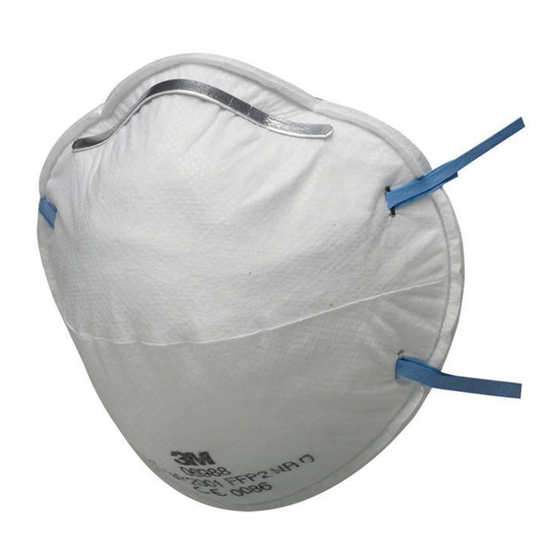3M 8810 Manual
Jelajahi secara online atau unduh pdf Manual untuk Produk Pernapasan 3M 8810. 3M 8810 2 halaman.
Juga untuk 3M 8810: Petunjuk Penggunaan (3 halaman), Panduan Memulai Cepat (2 halaman)

8810 Respirator
Data Sheet
Main Features
The 3M 8810 respirator provides lightweight, effective, comfortable
and hygienic respiratory protection against dusts and mists. The
convex shape, twin strap design, foam nose seal and aluminium
nose clip ensure a good face seal over a wide range of face sizes.
The 3M 8810 is exempt from costly time consuming
maintenance requirements.
Applications
• Base Metal Manufacture
• Laboratories
• Powdered Additives
Approvals
• The 3M 8810 has been shown to meet the Basic Safety
Requirements under Article 10 and 11B of the European
Community Directive 89/686.
• Meets the performance requirements of the European
Standard for filtering facepiece dust respirators
EN149:2001 FFP2
• The product is CE-marked.
Materials
The following materials are used in the production of this product:
• Straps
-
• Nose-clip
-
• Filter/shell
-
• Nose foam
-
Weight: 8 g
• Pharmaceuticals
• Foodstuffs e.g. Bagging
• Powdered Chemicals
• Sawmills
Natural Rubber
Aluminium
Polypropylene/Polyester
Polyurethane
Standards
The product has been tested to the European Norm EN149: 2001
and has met the requirements of category FFP2 in this standard.
The main performance tests in this standard are:
• Filter Penetration
• Total Inward Leakage
• Flammability
• Breathing Resistance
• Performance
The 8810 offers an Assigned Protection Factor of 10 (Nominal
Protection Factor of 12); i.e., it can be used in atmospheres
containing up to 10 times the Workplace Exposure Limit (WEL) of
particulate contaminant as specified in the Health & Safety
Executive Guidance note EH40.
Warnings
• As with the use of any respiratory device, the wearer must
first be trained in the proper use of the product.
• This product does not protect the wearer against gases,
vapours, solvents from paint spray operations or atmospheres
containing less than 19.5% oxygen.
• Use only in adequately ventilated areas containing sufficient
oxygen to support life.
• Do not use when concentrations of contaminants are
immediately dangerous to life or health.
• Leave the area immediately if:
* breathing becomes difficult
* dizziness or other distress occurs
• Discard and replace respirator if it becomes damaged,
breathing resistance becomes excessive, or at the end
of one shift.
• Never alter or modify this device.
